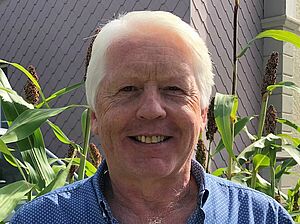"The FiBL variety trials are very valuable"
50th anniversary voices
Hans-Georg Kessler is a member of the management of the organic farmers' cooperative Biofarm which works with FiBL on various projects. (Photo: Melanie Rediger)
Hans-Georg Kessler has been in charge of cultivating and marketing organic oilseeds and other arable crops at Biofarm for 12 years. He is a member of the management of the organic farmers' cooperative which, like FiBL, is one of the five founding organisations of Bio Suisse and works closely with FiBL on various projects.
What is your connection with FiBL?
At the end of the 1970s, I visited FiBL as a schoolboy – a visit that awakened my enthusiasm for organic agriculture: Thank you, Otto Schmid! I went through agricultural training, became a farmer – and a subscriber to the magazine 'zB' published by FiBL from the very beginning. For a long time, I worked in the field of organic animal husbandry, where I maintained close contact with FiBL advisers. The collaboration then deepened at Biofarm through an oilseed rape project for which Biofarm was able to find a sponsor for the research and advisory work.
Did this project advance the cultivation of organic oilseed rape?
The funds enabled research projects at FiBL (on scents to deter the pollen beetle) and at Agroscope (on entomophagous fungi) as well as advisory activities. Unfortunately, the research projects did not lead to a breakthrough, but they certainly contributed to maintaining the motivation of the organic oilseed rape producers: they showed that, despite all the gloomy predictions and pest problems, organic oilseed rape production is possible under certain conditions.
Organic oilseeds are in demand – which research topics need to be tackled?
The term "in demand" is a bit tricky... Good demand does not fall from the sky and the market is ever-changing, sometimes even fickle. Long-term work such as research involves the risk that the results will be available at a time when no one might need them anymore. One example is hemp for oil production, where FiBL and Biofarm are working together in several projects to improve cultivation techniques – but the demand for hemp products has so far been disappointing. In principle, the need for research in arable farming, especially in the more specialised crops, is almost inexhaustible – and neither practice nor market players can produce the necessary scientific knowledge. That is where FiBL comes in. The FiBL variety trials, among others, are very valuable.
When you look to the future, what would you like to see from FiBL?
FiBL's work over the past 20 years has maybe become more relevant for the important decision-makers such as politicians, authorities, Bio Suisse, wholesalers, etc. I would like FiBL to remain relevant and accessible to farmers.




